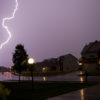According to the hurricane forecast this year, there will most likely be at least two major hurricanes to hit the country. Although the number may be small, it was the same in 2018 with two hurricanes causing many people to lose their homes, while also causing billions of dollars’ worth of damage and dozens of lives. Florida, on the other hand, will probably be hit by up to 15 tropical storms.
Every year, preparation for hurricanes is one of the things that should be on the minds of swimming pool homeowners. It is important to be prepared. The professionals at Pool Troopers want you to be ready before, during, and after a hurricane or tropical storm hits.
If you own a pool, you have a responsibility to ensure that you protect this part of your property. States such as Texas and Florida have many homes with in-ground swimming pools. If you are among those homeowners, it is vital that you take the necessary steps to keep everything safe, including your pool.
If you have no clue on what you should do, Pool Troopers has got you covered. Here are a few things that you need to know when catastrophes are bound to strike:
• Should you drain your pool?
The short answer to this question is, NO. You should always make sure that the water levels in the pool are sufficient. It is a necessity because it provides the required weight, which helps in holding the structure in place. Adequate water levels will aid in keeping your pool in the ground during the storm, especially the strong, destructive ones.
Heavy rains are a huge problem at this time. If you have emptied the pool, it can lead to excessive groundwater causing your pool to float or “pop” out of the ground. There are many instances where pools without water “pop” out under normal groundwater conditions. A tropical storm with lots of rain and tidal surges only makes that probability higher if your pool is empty.
• Should you lower the water level of your pool?
Completely draining and lowering the water levels of the swimming pool are two different things. But the answer is the same, NO, do not lower your water level beyond the proper fill point of the pool, which is halfway up the skimmer opening. Lowering the water level more than that is not recommended.
• What about the water chemistry?
You should prepare your pool water before the storm hits. Make sure your pool chemistry is properly balanced and has an adequate does of Free Chlorine to withstand heavier than normal rain. Of course, if your back yard gets flooded by the storm you can’t prep your pool for that. So just prep for a heavy storm and if its worse…plan to clean it up after the water has receded to safe levels in your area. The most important thing is your safety.
Do not swim in a pool that’s been flooded during a storm until you have rebalanced, and shocked that water and it has returned to blue and clear with a strong chlorine reading. There is no telling what contaminants got into the water from the flooding.
With the essential questions that you may have already answered, it is time to proceed to other measures that will help you be prepared in time for a hurricane. Here are the necessary steps for preparing your pool BEFORE the hurricane hits:
- If you have not shocked your pool yet, make sure that you have added extra chlorine to the water. Chlorinating the water will help fight potential pollutants that can contaminate the water as the storm progresses. Note that shocking the pool means that you may not be able to use it for about 24 hours. To be sure, read the instructions from the chemicals and supplies that you have used.
- Make sure that the electric breaker system connected to your pool is turned off. It can cause electrical surge damage if you forget to turn it off during the storm. All mechanical systems, lighting, and others should be turned off as well. If your pool equipment is under water you don’t want the timer kicking on and your equipment to burn out and to cause electrical hazards to you or others around your home.
Aside from keeping the water and the pool structure safe, you should also take a look at the surroundings. Your yard can easily hurt your pool if you do not include it in your hurricane preparation. Here are the things that you should do:
- Trim the bushes, trees, and anything with leaves and branches. General upkeep all year round will help reduce the need to trim the trees in your yard. If you have large trees, make sure there are no low-hanging branches. The branches should also be carefully cut so they do not aid in damaging your property.
- Check the utility lines as well and ensure that there are no branches touching them. If there are you must have a professional to do it for you or the utility company can help you with tree trimming around power lines.
The final step is to take a good look at the pool area and examine everything from top to bottom. There should no longer be furniture, plants, and other loose items hanging around. If there are charcoal or gas grills, get them inside the garage or a shed. Do not put gas grills in your home or garage unless the propane tank has been removed. Of course, you should not use them when they are indoors.
Propane tanks should be not be stored inside an attached garage or home and if outdoors, they should be kept away from your home. Keep them chained in an upright position outside your house.
Some homes may have bulkier objects outdoors, which are impossible to put inside the house. If you are in this situation, you can anchor these items using rope or even chains. The significant thing is to ensure they will not start moving around once the hurricane begins.
Once the storm is over, you know that cleaning will once again involve heavy work. You can leave this task to the professionals at Pool Troopers. Be sure to check the surroundings first before you inspect the pool if there is any damage. Do not walk out into standing water.
Some homeowners may have chosen to submerge a few of their lawn furniture pieces in the pool. If you did the same thing, take them out of the water right away. Never put glass furniture or table tops in the pool. Also, take the time to inspect the plumbing, filter, and pumps to see if there is any visible damage before attempting to restart your system. Again, do not start your system if there is still standing water on the equipment. If you’re standing in water do not touch your pool’s electrical system!




